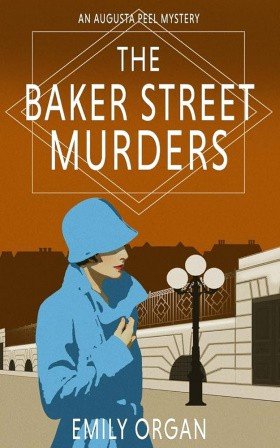A smile spread across his face. ‘Jemima Kemp. She was a treasure!’
It was clear she had left an impression on Mr Shaw as well as Miller and Gibson.
‘She worked here for a couple of years before she got married. A pretty girl she was.’ His gaze drifted off into the middle-distance. ‘She was what I’d describe as a proper English rose.’
Augusta felt a snap of impatience. ‘Did she have a relationship with Mr Miller or Mr Gibson?’
‘You’re asking the wrong man, I’m afraid, Mrs Peel. I was too old to know about the affairs of the young people here. Even back then.’
‘Do you know where she is now?’
‘When she married, she and her new husband moved out to the suburbs. Wimbledon rings a bell.’
‘Do you know her married name?’
‘Campbell, I believe. Her husband is Jeffrey Campbell, a Scottish doctor. I wonder what Jemima looks like now? Quite different, I should imagine.’
‘Thank you. I shall speak to her next.’
‘Oh, I shouldn’t think she’d be able to tell you much. She worked in the same office as the two gentlemen and that was about it.’
‘From what I understand, both Mr Miller and Mr Gibson were quite fond of her.’
‘Well, they would have been! Everyone was fond of Jemima.’ He chuckled. ‘I was too. And I was approaching sixty and had been happily married for thirty-seven years!’
He had presumably been expecting Augusta to laugh with him, because his smile quickly disappeared when he realised she wasn’t.
‘Thank you very much for your time, Mr Shaw.’ She got to her feet.
‘It’s been a pleasure, Mrs Peel. I’m not sure what you’re trying to find out, but good luck with it anyway. And if you do speak to Mrs Jemima Campbell, please pass on my regards.’
Chapter 28
Augusta sat down to read more of John Gibson’s letters that evening. Frustratingly, the next few didn’t mention Jemima. Instead, they described more cycling excursions and a complaint that Jackson’s Blood Purifier had done nothing to improve John’s cycling uphill. He seemed irritated that Alexander could cycle faster than him.
‘Jemima Campbell,’ said Augusta, sitting back in her chair. Sparky eyed her from the top of the shade on the table lamp. ‘She should be fairly easy to find in Wimbledon, shouldn’t she, Sparky? Perhaps Fred could help me find her address by looking in the directory. He’s becoming quite useful in this investigation.’
She wondered for a moment if any other detectives discussed cases with their canaries, then picked up the next letter. Her eyes strained as she tried to decipher the words. Then a sentence aroused her interest: “Alexander was in a dreadfully bad mood as we cycled to Epsom.” Augusta read on, keen to find out why.
‘How interesting,’ she said to Sparky once she reached the end of the letter. ‘It seems Alexander lent his sister, Jane Stanton, some money. And he got rather fed up when she failed to repay him.’
Chapter 29
Augusta made her way to Baker Street the following morning. It was warm and sunny, so she decided to walk. Her forty-minute route took her through the bustling streets of Bloomsbury, Fitzrovia and Marylebone. She passed elegant old townhouses, towering red-brick apartment buildings and lively shops and cafes. Barrels of beer were being unloaded outside public houses and newspaper sellers shouted out the day’s headlines.
As she walked, Augusta considered Robert Stanton’s recent visit. He had advised her to stop looking into Alexander Miller’s disappearance. A mild threat. Was it because he was worried she would discover the family conflict over money?
His lack of concern for his missing brother-in-law made more sense to her now. From what Augusta had read in the most recent letter, it was possible Alexander Miller and his sister had not been on good terms at the time of his death.
She hoped Robert Stanton was currently at work and that she would find Jane Stanton alone.
Her apprehension grew as she reached the hairdresser’s shop below the Stanton’s flat. If Mr Stanton was at home, then he was likely to be angered by her visit. Augusta decided it was a risk she would have to take. She was keen to find out how Jane Stanton was going to explain the money she had borrowed from her brother.
Augusta was relieved when Mrs Stanton answered the door. But the coolness in her expression suggested she wasn’t happy to see Augusta there.
‘I’ve said all I need to say,’ said Mrs Stanton. ‘I really have nothing else to add.’
‘Have you heard from the police about the forged letter yet?’
‘No. And I don’t really expect to. There’s nothing more they can do.’
She moved to close the door and Augusta realised she only had a few seconds left in which to grab her attention. ‘Did you ever pay back the money which you owed your brother?’ she hurriedly asked.
Mrs Stanton froze. ‘I beg your pardon?’
‘I’m reading some letters which John Gibson wrote. He describes your brother being angry about some money you owed him.’
Her expression hardened. ‘Why on earth was Alexander discussing money with a friend he went cycling with?’
‘I can’t answer that, Mrs Stanton. It’s just something which was written in the letter.’
‘He had no business discussing that!’ She sneered at Augusta, as if she were responsible for it.
‘You can tell me your side of the story, Mrs Stanton. I’m not passing judgment on you.’
‘I’m sure you are. You’d probably be delighted to uncover some ugly business between me and Alexander. No family is perfect, you know.’
‘I’m aware of that.’

























